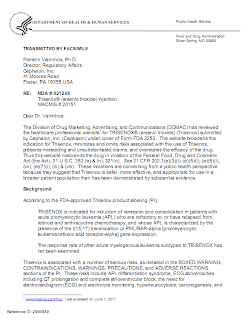“You’re In Timeout!”
Let’s start with the less serious problem—a Notice of Violation. These are written by DDMAC reviewers and are typically addressed to a regulatory affairs employee of a pharmaceutical company. They follow the same typical format:
- Dear [Name of Regulatory Professional]
- Background of drug (e.g. indications and usage)
- You’re in timeout because…
- …and you’d better stop in 14 days.
- Overstatement of efficacy
- Unsubstantiated claims
- Omission/Minimization of Risk
- Broadening of indication
- Any other category DDMAC deems violative
So what do these letters mean to pharmaceutical companies? Well, it hurts their reputation, they lose revenue in destroying and recalling the violative material, and they also lose revenue due to lack of promotion. These letters are then published to set precedence for other pharmaceutical companies.
Click on the thumbnail below to view the most recent Notice of Violation letter from June 21, 2011 for Trisenox (arsenic trioxide).

“You’re Grounded!”
Ah yes, the infamous Warning Letter. These are given out to companies that have advertising and promotional material that may cause more serious threats to the public health. Recall that Notices of Violation are written by DDMAC reviewers and are addressed to a regulatory affairs employee. For Warning Letters, these bad boys are signed by the Director of DDMAC himself, Thomas W. Abrams, RPh, MBA, and are addressed to the CEO of the company to emphasize leadership accountability.
The letters follow a similar format of a Notice of Violation with slight changes in italics:
Click on the thumbnail below to view the most recent Warning Letter from May 6, 2011 for Vyvanse (lisdexamfetamine dimesylate) capsules.
Okay folks, that’s it for this installment of Regulatory Affairs 101. Tune in next time for our next lesson on TV ads. Remember kids, stay in school and always listen to your mother.
Eric Zhao
I am currently a summer intern in the Regulatory Affairs Department, and the opinions and positions expressed are my own and don’t necessarily reflect those of Abbott Laboratories.
Ah yes, the infamous Warning Letter. These are given out to companies that have advertising and promotional material that may cause more serious threats to the public health. Recall that Notices of Violation are written by DDMAC reviewers and are addressed to a regulatory affairs employee. For Warning Letters, these bad boys are signed by the Director of DDMAC himself, Thomas W. Abrams, RPh, MBA, and are addressed to the CEO of the company to emphasize leadership accountability.
The letters follow a similar format of a Notice of Violation with slight changes in italics:
- Dear [Head Honcho of Company]
- Background of drug (e.g. indications and usage)
- You’re grounded because…
- …and you’d better stop in 14 days. PS fix the problem.
Click on the thumbnail below to view the most recent Warning Letter from May 6, 2011 for Vyvanse (lisdexamfetamine dimesylate) capsules.
Okay folks, that’s it for this installment of Regulatory Affairs 101. Tune in next time for our next lesson on TV ads. Remember kids, stay in school and always listen to your mother.
Eric Zhao
I am currently a summer intern in the Regulatory Affairs Department, and the opinions and positions expressed are my own and don’t necessarily reflect those of Abbott Laboratories.
 Eric Zhao
Eric Zhao

No comments:
Post a Comment